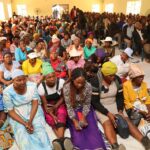Harare – High Court judge, Justice Gladys Mhuri, has dismissed an application by prominent Harare lawyer Obey Shava, represented by veteran constitutional lawyer Tendai Biti, seeking to compel President Emmerson Mnangagwa to sign and accede to the Convention Against Torture (CAT). The ruling, delivered at the Harare High Court, determined that the courts cannot interfere with the executive’s discretion in international treaty ratification.
Shava’s application, filed earlier this year, named Justice Minister Ziyambi Ziyambi, President Mnangagwa, the Parliament of Zimbabwe, and the Zimbabwe Human Rights Commission as respondents. The application stemmed from a brutal assault Shava allegedly suffered at the hands of state agents in July 2023, an incident that left him severely injured and wheelchair-bound for months. He argued that the President’s failure to sign CAT demonstrated a disregard for his constitutional rights and the prevention of future torture.
Justice Mhuri’s judgment centred on the principle of separation of powers. She stated, “The above subsection (4) confers a discretion on the President to conclude or execute conventions. It does not impose a mandate on second Respondent (Mnangagwa) to sign or accede to a convention.”
The judge acknowledged submissions indicating Zimbabwe’s consideration of CAT accession, including its mention in the Universal Periodic Review (UPR) report. She further noted that Zimbabwe is one of only two countries that have not acceded to and ratified CAT. However, she ruled that, “Be that as it may, it is my considered view that this court cannot compel Mnangagwa to do what it is by law not compelled to do, to wit sign a convention. Here then kicks in the doctrine of separation of powers.”
The judge elaborated on the doctrine of separation of powers, ultimately concluding, “I associate myself with the above remarks and reiterate that this court cannot compel Mnangagwa to do what he is not compelled by law to do. Consequently, I cannot grant the mandamus order sought by the applicant. In the result, the application is hereby dismissed with no order as to costs.”
The court heard detailed testimony regarding Shava’s ordeal. The incident began with a scheduled meeting with individuals who identified themselves as potential clients. Shava recounted how he met Tinashe Mazodze, who had contacted his law chambers seeking legal counsel. A meeting was arranged for 5 July 2023 at 10:00 am. Later that day, Shava met Mazodze and three other men at Energy Park, Show Grounds, in a dimly lit area. Two of the men introduced themselves as Tatenda and Spencer.
Shava testified that he questioned why a file had been opened under Mazodze’s name when Tatenda appeared to be the individual requiring legal assistance. He then attempted to drive to a colleague’s office, followed by the men in their unmarked silver Mercedes Benz. Upon parking, two more vehicles, a pick-up truck and a Range Rover, arrived. After these vehicles departed, the assault began.
Shava described the attack: “Then two other vehicles, a pick-up truck and a Range Rover arrived and parked close by. The two vehicles then left and he was left with his potential clients. He then asked them to tell him their story and they told him that they were being accused of stealing US$250 000 at Kefalos and the police were on their case,” the court heard. He was subsequently assaulted, kicked, and struck with an iron bar, losing consciousness. He was rescued by members of the public and taken to hospital for treatment.
In support of his claim, Shava cited several other alleged cases of torture and abduction in Zimbabwe, including those of Tonderai Ndira, James Chidakwa, Takudzwa Ngadziore, Tinashe Chitsunge, Bishop Tapfumaneyi Masaya, and Doctor Peter Mugombeyi. He also referenced historical instances of violence, including Gukurahundi and election-related violence. He argued that the lack of investigation and prosecution in these cases demonstrated a systemic failure to address torture.
The respondents, Ziyambi and Mnangagwa, opposed the application. They argued that Shava’s inclusion of various unrelated allegations of torture was irrelevant to his case. They denied that torture and violence are widespread in Zimbabwe, asserting that existing laws provide adequate remedies. They further maintained that the President’s discretion in ratifying international conventions cannot be judicially compelled.
“No sovereign state is compelled to accede to the Convention,” they argued.
Parliament indicated it would abide by the court’s decision, while the Zimbabwe Human Rights Commission did not participate in the proceedings.

Follow @MyZimbabweNews












